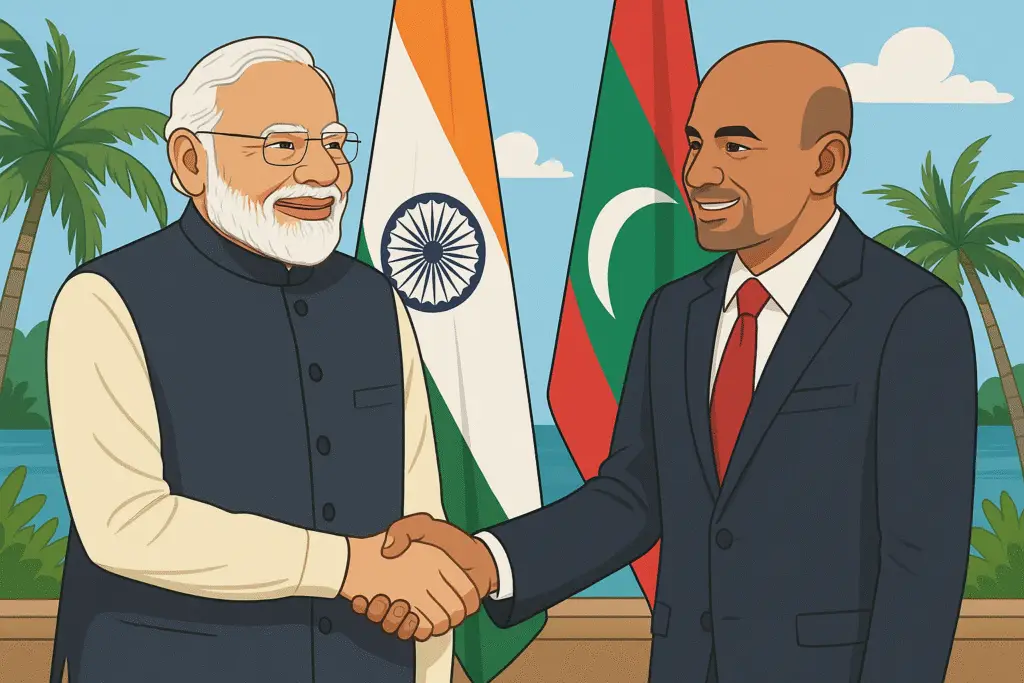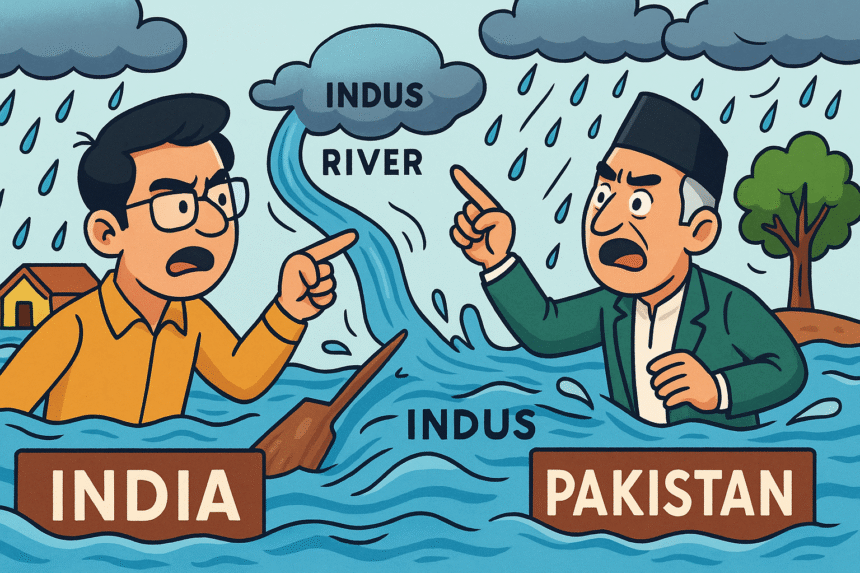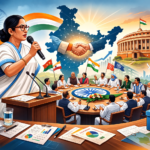Pakistan blames India for floods under the Indus Water Treaty. We decode the drama with humor, clarity, and simple facts.
- The Indus Water Treaty: A Crash Course
- What Happened This Time?
- Why Is Pakistan Upset?
- India’s Side of the Story
- The Meme-Worthy Analogy
- The Larger Picture
- Why This Treaty Still Matters
- Voices From Both Sides
- The Role of Media
- Why Should You Care?
- The Humor Recap (Because We Love Lists)
- Suggested Related Nokjhok Article
In South Asia, monsoons bring two things—water and blame. This year, as rivers rose and floods spread, Pakistan pointed fingers at India faster than kids blame siblings for breaking the TV remote.
The accusation? India “released water” under the Indus Water Treaty, flooding areas in Pakistan.
India’s reply? “Bhai, it’s the rain, not us.”
And suddenly, a treaty signed in 1960 is trending again like an old Bollywood song remixed for Gen Z.
If you want the serious report, even Navbharat Times has covered it here. But if you prefer the funny-yet-factual version, read on.
The Indus Water Treaty: A Crash Course
Let’s rewind to 1960. India and Pakistan, after some serious discussions (and probably gallons of chai), signed the Indus Water Treaty (IWT) with the World Bank as witness.
- Rivers divided: Pakistan got rights over the Indus, Jhelum, and Chenab. India got the Ravi, Beas, and Sutlej.
- India’s rights: Even on Pakistan’s rivers, India could use water for non-consumptive needs (like hydropower, irrigation, and navigation).
- Joint mechanism: Both sides agreed to inform each other about water usage, projects, and flows.
Basically, it was a peace deal to avoid water wars. And surprisingly, it has survived even during wars and cricket matches.
What Happened This Time?
- Heavy Monsoon Rains: Pakistan faced major flooding.
- The Blame Game: People in Pakistan accused India of releasing “extra water” into rivers flowing into Pakistan.
- India’s Stand: India said water was released only as per treaty rules. When dams fill beyond safety levels, water has to be released.
Translation: “It’s the clouds, not a conspiracy.”
Why Is Pakistan Upset?
Floods in Pakistan cause:
- Crops to drown.
- Villages to suffer.
- Leaders to find a new villain (because blaming climate change isn’t as spicy for TV debates).
So, the narrative becomes: “India released water, look at our floods.”
For local politics, this works better than saying: “We didn’t prepare enough for the rains.”
India’s Side of the Story
India points out:
- Water release was necessary for dam safety.
- It informed Pakistan as per treaty obligations.
- Blaming India every monsoon is becoming a “seasonal tradition.”
In short: “Don’t shoot the messenger. Or in this case, don’t blame the dam operator.”
The Meme-Worthy Analogy
Imagine your neighbor builds a swimming pool. Monsoon rain overflows it. He opens the gate to let water flow into the street.
Now, you—living next door—start screaming: “Neighbor ne jaan bujh ke flood kar diya!”
That’s basically India-Pakistan every monsoon.
The Larger Picture
This isn’t just about floods. It’s about:
- Climate Change: Monsoons are getting harsher, glaciers are melting faster.
- Infrastructure: Poor flood management in Pakistan adds to the crisis.
- Politics: Water is always an emotional issue. Leaders know it wins headlines.
Why This Treaty Still Matters
The Indus Water Treaty is often called one of the most successful water-sharing agreements in the world. Despite wars, conflicts, and broken cricket ties, the treaty has survived.
But now, with changing weather patterns, rising demand, and political mistrust, it’s under stress like your Wi-Fi during IPL finals.
Voices From Both Sides
- Pakistani Citizens: “Why is India flooding us every year?”
- Indian Officials: “We only follow the treaty, nothing extra.”
- The Common Man: “Yaar, can both countries just Netflix and chill instead of flooding us with drama?”
The Role of Media
Pakistani media is playing the blame soundtrack. Indian media is countering with “It’s your mismanagement.”
Result? More shouting matches, fewer solutions.
(And yes, somewhere Arnab is already preparing: “INDUS! WATER! FLOOD! PAKISTAN!”)
Why Should You Care?
Because water isn’t just about rivers—it’s about food, power, and survival.
- Farmers depend on irrigation.
- Cities depend on dams for electricity.
- Villages depend on rivers for daily needs.
If treaties break or accusations keep flying, ordinary people on both sides will pay the price.
The Humor Recap (Because We Love Lists)
- Indus Water Treaty = 1960 peace pact on rivers.
- Pakistan accused India of “flooding them” by releasing water.
- India said: “Not our fault, blame the rain.”
- Media on both sides = louder than thunder.
- Real issue = climate change, poor planning, and political blame games.
Forward this before Arnab screams it on TV and makes it sound like the sequel to Gadar 2.
Suggested Related Nokjhok Article
👉 “From ‘India Out’ to ‘Welcome India’ — How New Delhi Turned the Tide in Maldives”













